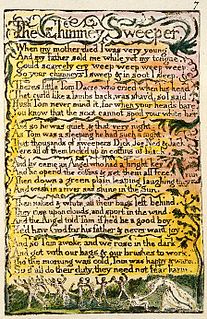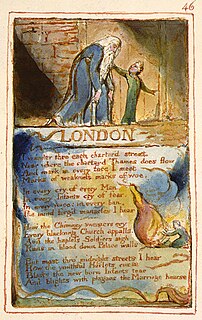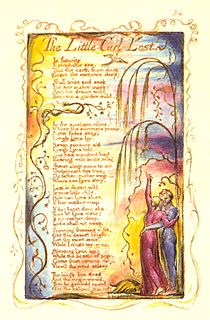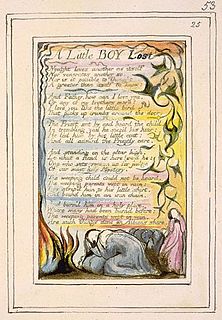
"The Chimney Sweeper" is the title of a poem by William Blake, published in two parts in Songs of Innocence in 1789 and Songs of Experience in 1794. The poem "The Chimney Sweeper" is set against the dark background of child labour that was prominent in England in the late 18th and 19th centuries. At the age of four and five, boys were sold to clean chimneys, due to their small size. These children were oppressed and had a diminutive existence that was socially accepted at the time. Children in this field of work were often unfed and poorly clothed. In most cases, these children died from either falling through the chimneys or from lung damage and other horrible diseases from breathing in the soot. In the earlier poem, a young chimney sweeper recounts a dream by one of his fellows, in which an angel rescues the boys from coffins and takes them to a sunny meadow; in the later poem, an apparently adult speaker encounters a child chimney sweeper abandoned in the snow while his parents are at church or possibly even suffered death where church is referring to being with God.

"The Echoing Green" is a poem by William Blake published in Songs of Innocence in 1789. The poem talks about merry sounds and images which accompany the children playing outdoors. Then, an old man happily remembers when he enjoyed playing with his friends during his own childhood. The last stanza depicts the little ones being weary when the sun has descended and going to their mother to rest after playing many games.

The Book of Urizen is one of the major prophetic books of the English writer William Blake, illustrated by Blake's own plates. It was originally published as The First Book of Urizen in 1794. Later editions dropped the "First". The book takes its name from the character Urizen in Blake's mythology, who represents alienated reason as the source of oppression. The book describes Urizen as the "primeaval priest" and tells how he became separated from the other Eternals to create his own alienated and enslaving realm of religious dogma. Los and Enitharmon create a space within Urizen's fallen universe to give birth to their son Orc, the spirit of revolution and freedom.

"London" is a poem by William Blake, published in Songs of Experience in 1794. It is one of the few poems in Songs of Experience that does not have a corresponding poem in Songs of Innocence. Blake lived in London so writes of it as a resident rather than a visitor. The poems reference the "Two Contrary States of the Human Soul". The "Songs of Innocence" section contains poems which reference love, childhood and nature. Critics have suggested that the poems illustrate the effects of modernity on people and nature, through the discussion of dangerous industrial conditions, child labour, prostitution and poverty.

"The Garden of Love" is a poem by the Romantic poet William Blake. It was published as part of his collection, Songs of Experience.
"Auguries of Innocence" is a poem by William Blake, from a notebook of his now known as the Pickering Manuscript. It is assumed to have been written in 1803, but was not published until 1863 in the companion volume to Alexander Gilchrist's biography of Blake. The poem contains a series of paradoxes which speak of innocence juxtaposed with evil and corruption. It consists of 132 lines and has been published with and without breaks dividing it into stanzas. An augury is a sign or omen.

"The Clod and the Pebble" is a poem from William Blake's 1794 collection Songs of Innocence and of Experience.

The Little Girl Lost is a 1794 poem published by William Blake in his collection Songs of Innocence and of Experience. According to scholar, Grevel Lindop, this poem represents Blake's pattern of the transition between "the spontaneous, imaginative Innocence of childhood" to the "complex and mature adult state of Experience."

"The Angel" is a poem written by the English poet William Blake. It was published as part of his collection Songs of Experience in 1794.

The Little Vagabond is a 1794 poem by William Blake in his collection Songs of Innocence and of Experience. His collection, Songs of Innocence, was originally published alone, in 1789. The scholar Robert Gleckner says that the poem is a form of transformation of the boy in the poem "The School Boy", from Songs of Innocence.

"Infant Joy" is a poem written by the English poet William Blake. It was first published as part of his collection Songs of Innocence in 1789 and is the counterpart to "Infant Sorrow", which was published at a later date in Songs of Experience in 1794.

"A Divine Image" is a poem by William Blake from Songs of Experience, not to be confused with "The Divine Image" from Songs of Innocence. The poem only appeared in copy BB of the combined Songs of Innocence and of Experience.

Infant Sorrow is a poem by William Blake from Songs of Experience.
"The Fly" is a poem written by the English poet William Blake. It was published as part of his collection Songs of Experience in 1794.

The Voice of the Ancient Bard is a poem written by the English poet William Blake. It was published as part of his collection Songs of Innocence in 1789, but later moved to Songs of Experience, the second part of the larger collection Songs of Innocence and of Experience, 1794.

Spring is a lyric poem written and illustrated by William Blake. It was first published in Songs of Innocence (1789) and later in Songs of Innocence and Experience (1794).

"The Little Boy Found" is a poem by William Blake first published in the collection Songs of Innocence in 1789. Songs of Innocence was printed using illuminated printing, a style Blake created. By integrating the images with the poems the reader was better able to understand the meaning behind each of Blake's poems.

"The Little Boy Lost" is a simple lyric poem written by William Blake. This poem is part of a larger work entitled Songs of Innocence which was published in the year 1789. "The Little Boy Lost" is a prelude to "The Little Boy Found".

"Laughing Song" is a poem published in 1789 by the English poet William Blake. This poem is one of nineteen in Blake's collection Songs of Innocence.

"A Little Boy Lost" is a poem of the Songs of Experience series created in 1794 after the Songs of Innocence (1789) by the poet William Blake. The poem centers on the theme of religious persecution and the corrupted dictates of dogmatic Church teachings. As part of Songs of Experience the poem is set in the wider context of exploring the suffering of innocent and oppressed individuals—in this case a young boy, and his parents—within a flawed society that is oppressed and disillusioned with life's experience.


















